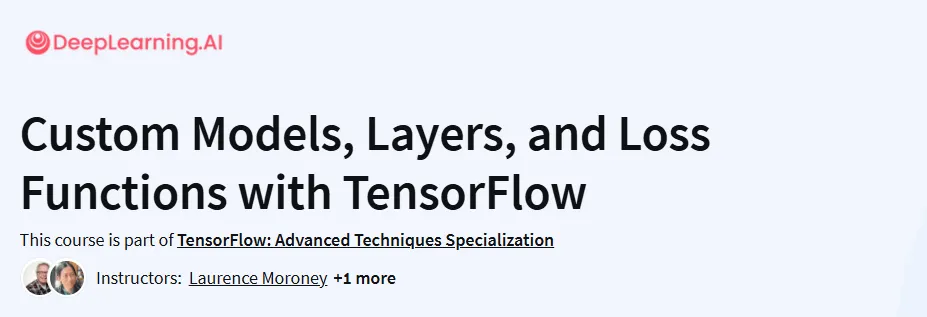What will you learn in this Custom Models, Layers, and Loss Functions with TensorFlow Course
Differentiate between Functional and Sequential APIs in TensorFlow and build advanced models like Siamese networks.
Develop custom loss functions, including contrastive loss, to enhance model training.
Create custom layers using Lambda layers and subclassing techniques.
Design and implement custom models by extending the TensorFlow Model class, including architectures like ResNet.
Program Overview
1. Functional APIs
⏳ 7 hours
Explore the flexibility of the Functional API over the Sequential API and implement models with multiple inputs and outputs, such as Siamese networks.
2. Custom Loss Functions
⏳ 7 hours
Learn to create custom loss functions, including the contrastive loss function, to better measure model performance and guide training.
3. Custom Layers
⏳ 7 hours
Build custom layers by extending existing ones or using Lambda layers, and understand their role in model architecture.
4. Custom Models
⏳ 6 hours
Design custom models by subclassing the TensorFlow Model class, enabling the creation of complex architectures like ResNet.
5. Custom Callbacks
⏳ 3 hours
Implement custom callbacks to monitor and control the training process, such as early stopping to prevent overfitting.
Get certificate
Job Outlook
Equips learners for roles such as Machine Learning Engineer, Deep Learning Specialist, and AI Developer.
Applicable in industries like healthcare, finance, and technology where advanced model customization is essential.
Enhances employability by providing practical skills in building and deploying sophisticated TensorFlow models.
Supports career advancement in fields requiring expertise in custom neural network architectures and training techniques
Specification: Custom Models, Layers, and Loss Functions with TensorFlow
|
FAQs
- Basic knowledge of TensorFlow and Keras is expected.
- Familiarity with Sequential and Functional APIs is useful.
- Prior exposure to training simple models helps.
- Strong Python coding skills are recommended.
- Beginners may find it challenging without prior practice.
- Focuses on building flexible and scalable model architectures.
- Provides experience with custom callbacks for training control.
- Skills can be applied to enterprise-level projects.
- Does not cover deployment pipelines in full detail.
- Best paired with deployment-focused courses for end-to-end expertise.
- Customization allows solving highly domain-specific problems.
- Enables integration of unique business or research requirements.
- Gives flexibility beyond pre-defined architectures.
- Enhances performance tuning with custom training objectives.
- Builds deeper understanding of how TensorFlow works internally.
- Applicable in natural language processing tasks.
- Useful for building recommender systems.
- Helps in time-series forecasting and anomaly detection.
- Supports multimodal models (text + image, etc.).
- Adaptable to healthcare, finance, and IoT domains.
- Custom modeling is a high-demand skill for ML engineers.
- Sets you apart from candidates who only know basic TensorFlow.
- Demonstrates ability to handle real-world data challenges.
- Complements other ML and AI certifications.
- Strengthens portfolio with advanced project work.





